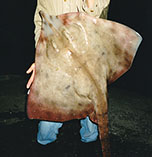| Family: |
Rajidae (Skates) |
| Max. size: |
230 cm TL (male/unsexed); 202 cm TL (female) |
| Environment: |
demersal; marine; depth range 30 - 600 m |
| Distribution: |
Eastern Atlantic and southwest Indian Ocean (British Isles to Mozambique) and the Mediterranean Sea. |
| Diagnosis: |
A giant skate with a broad-based, abruptly narrow-tipped snout covered with small, sharp thorns; pectoral disc angular, and no thorns on nape or back, but three rows of large thorns on tail (Ref. 5578). Larger immature and adult individuals grey with numerous small white spots above, underside white with no black pores; hatchlings plain reddish-brown above, often with blue spots, and white below with broad dusky grey margins on disc (Ref. 5578). |
| Biology: |
Inhabit shelf and slope waters (Ref. 4426). Found on sand and rock-sand bottom (Ref. 6808). A bottom-predator of bony fishes, other elasmobranchs, fish offal, crabs, shrimps, mysids, octopi, and cuttlefish (Ref. 5578). Minimum depth reported taken from Ref. 4426. Maximum length for female is 202 cm (Ref. 41333). Oviparous. Distinct pairing with embrace. Young may tend to follow large objects, such as their mother (Ref. 205). Eggs are oblong capsules with stiff pointed horns at the corners deposited in sandy or muddy flats (Ref. 205). Egg capsules are 12.5-18.3 cm long and 10.0-13.9 cm wide (Ref. 41250). About 55-156 eggs are produced per individual annually (Ref. 41250). |
| IUCN Red List Status: |
Endangered (EN); Date assessed: 31 January 2006 (A2cd+4cd) Ref. (130435)
|
| Threat to humans: |
traumatogenic |
Source and more info: www.fishbase.org. For personal, classroom, and other internal use only. Not for publication.

